| Srl | Item |
| 1 |
ID:
092166
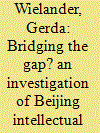

|
|
|
|
|
| Publication |
2009.
|
| Summary/Abstract |
This article investigates the link between Christian belief and the fight for political change in today's China focusing on the activities of certain Beijing house churches. It formulates the hypothesis that Chinese Christian intellectuals may be able to fulfil a special 'bridge-function' in Chinese society. This hypothesis is tested against evidence based on a close reading of two Beijing house church publications (Aiyan and Fangzhou) and interviews with intellectuals closely associated with these as well as 'ordinary' Christian intellectuals. Areas investigated include education, urban-rural co-operation, the demographic make-up of congregations, the Christian understanding of liberalism, and the activities of Chinese Christian human rights attorneys. It comes to the conclusion that while Christian intellectuals have great potential to play an important role in China's process of democratization, their most prominent members continue the splittist tradition of previous dissident groups while the more meaningful work is undertaken by unknown Christians away from the spotlight.
|
|
|
|
|
|
|
|
|
|
|
|
|
|
|
|
| 2 |
ID:
092162
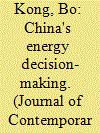

|
|
|
|
|
| Publication |
2009.
|
| Summary/Abstract |
This paper investigates why some energy decisions are made faster than others in a reformed and globalized China. This investigation uncovers five factors that determine whether a proposal becomes a decision in the Chinese political system: (1) associated benefits of the proposed decision for other policy problems; (2) presence of a consistent 'issue champion'; (3) strength of mobilized and united 'veto players'; (4) vertical and horizontal support; and (5) clear policy preferences of the central leadership. The paper argues that the Chinese decision-making process has become increasingly consultative, iterative, and participatory and that it is also increasingly prone to deadlock, inaction, and paralysis. Thus, the Chinese decision-making process is increasingly similar to that of the United States in the era of reform and globalization. While the capacity of the Chinese state to make and implement distributive policies has remained largely unchanged, reform and globalization has weakened its capacity to make and implement redistributive policies.
|
|
|
|
|
|
|
|
|
|
|
|
|
|
|
|
| 3 |
ID:
092161
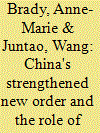

|
|
|
|
|
| Publication |
2009.
|
| Summary/Abstract |
The issue of whether or not the current regime in China is sustainable is one of the key questions of interest to specialists on Chinese politics today. The authors of this paper contend that the CCP government has actually strengthened its hold on power in recent years, rather than weakening it, as so many analysts predicted. The paper uses CCP propaganda work in the current era as a lens to consider why this might be so and utilizes the term 'Popular Authoritarianism' to describe China's new political order.
|
|
|
|
|
|
|
|
|
|
|
|
|
|
|
|
| 4 |
ID:
092163


|
|
|
|
|
| Publication |
2009.
|
| Summary/Abstract |
This article examines changes in China's welfare programs in the context of economic transition from planned economy to a market-oriented economy. Using the 1988 and 1995 Chinese Household Income Project (CHIP), we develop analytical models to study the critical impacts of institutional variables such as economic ownership types and economic sectors on key welfare programs in both rural and urban areas in China. Our findings show that the Chinese government drastically reduced welfare coverage for its citizens during the economic transitional period even though Chinese urban residents' welfare income was primarily determined by the type of their employment. Outperforming many other factors, work unit's ownership nature played a significant role in the provision of welfare benefits while the economic sectors largely failed to have any significant impacts. These findings indicate that China has been moving away from the active state model in welfare provision. Yet, an industrialization and resource-based welfare system has not been realized in China in the reform era.
|
|
|
|
|
|
|
|
|
|
|
|
|
|
|
|
| 5 |
ID:
092164


|
|
|
|
|
| Publication |
2009.
|
| Summary/Abstract |
The crippled economic and political reform in China has come with two schools of thought: the new-left and nationalism. The new-left focuses on domestic issues, while nationalism tackles more international relationships. This paper explores the effects of radical nationalism on China's democratization process. It argues that if nationalism takes the dominant position in China's political process, Chinese reform will go astray.
|
|
|
|
|
|
|
|
|
|
|
|
|
|
|
|
| 6 |
ID:
092159
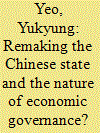

|
|
|
|
|
| Publication |
2009.
|
| Summary/Abstract |
This report explains the shifts and strains in the 2008 super-ministry government reform, focusing on the reform of government institutions of economic governance. Drawing on interviews with officials and scholars in Beijing after the reform, and on Chinese-language reports and books, this study suggests that the key to substantial progress in remaking the Chinese state into a macroeconomic regulator is the reform of the National Development and Reform Commission (NDRC), which was lacking in the 2008 scheme. Its powerful authority for investment endorsement is particularly problematic. A continued administrative malaise in the energy sector and strategically articulated state engagement in industrial development also should be noted as the salient features of China's economic governance.
|
|
|
|
|
|
|
|
|
|
|
|
|
|
|
|
| 7 |
ID:
092160
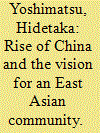

|
|
|
|
|
| Publication |
2009.
|
| Summary/Abstract |
This article seeks to explore how stable regional order under the possible community formation can be created in East Asia in moves towards China's ascendancy. For this objective, it takes advantage of a framework assuming that the development of an East Asian community would be possible under conditions that the states in the region develop common identity and norms, as well as multilateral institutions that guarantee the long-term interest. Moreover, the society needs to be involved in identity formation and institution-building. This article argues that China has been gradually embedded into formal multilateral institutions and less formal policy networks formed by state and non-state actors, which have been conducive to the creation of a regional community. However, both collective norms at the governmental level and shared cultural consciousness at the public level have not developed enough to have significant influences on directing China firmly to the formation of a regional community.
|
|
|
|
|
|
|
|
|
|
|
|
|
|
|
|
| 8 |
ID:
092158


|
|
|
|
|
| Publication |
2009.
|
| Summary/Abstract |
Though the United States remains atop the world's power hierarchy, it is becoming less dominant, both because of the rise of new power centers and because the problems are becoming larger. The United States now must function in a world of relatively greater power equality and ever-larger problems springing from interdependence. The United States and China now have to look each other straight in the eyes, with the core of their relationship resting on the strategic foundation of stabilization-stabilization of the global economy, global ecosystem, and global security. This essay makes several additional points: (1) China has made some wise domestic and foreign economic policy decisions in the context of the great economic downturn of 2007-2009 that probably will increase the PRC's relative capacities coming out of the downturn; (2) US-China relations are more fundamentally sound than they have ever been before. Both nations' leaders should seize this opportunity to recast their relationship as partners in the effort to build coalitions to address the global system's most pressing challenges; and (3), even with a relatively sound strategic foundation for bilateral relations, when one moves from the general to the specific in important policy domains, it will be exceedingly difficult for Beijing and Washington to reach agreements on how to proceed on many key issues.
|
|
|
|
|
|
|
|
|
|
|
|
|
|
|
|